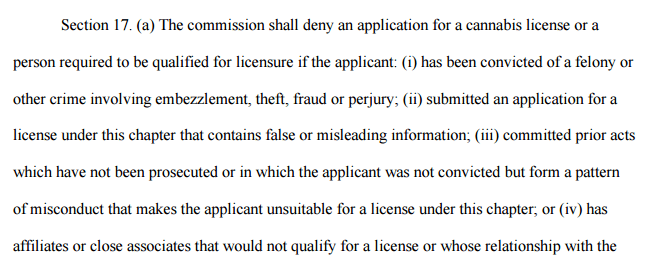
The most recent recitals of the Beacon Hill Cannabis Follies have been taxing.
That’s not just a swipe at the contested revisions that some members of the Massachusetts House of Representatives are looking to add to the recreational weed law. It’s a knock on the feet-shuffling of local pols in the half a year since Question 4 passed, and on how so much procrastination has now thrown all efforts to revise the law into an overheated hyperdrive, with the countdown clock ticking intensely.
If House and Senate members are to ensure that legal retail sales get underway by July 2018, as is currently the plan, they will have to reach agreement on amendment details by the end of this month. Never mind that the people of Mass voted overwhelmingly for specific provisions that, in many cases, have been disregarded and maligned by several lawmakers.
For a quick refresher on contested details, a House revision introduced last week would have more than doubled the tax rate on recreational cannabis from 12 to 28 percent, as well potentially added a 21.75 percent tax on medical marijuana. Also, either thanks to a clerical fuckup or for insidious reasons, language in said House revision could have led to even higher taxes on some cannabis products. House Speaker Bob DeLeo yanked that rewrite from a scheduled floor vote last week after drawing the ire of pot advocates, but this Monday members of the Joint Committee on Marijuana Policy advanced a hideously similar version anyway. Among other serious setbacks, the House bill calls for shifting banning abilities in municipalities from actual voters to aldermen, selectmen, and councilors.

With all this news swirling around, earlier this month activists gathered on the State House staircase to voice their concerns about, among other things, the fact that commercial tobacco industry lobbyists reportedly want cannabis producers in Mass to sell products through them. It’s just the latest example of an industry with something to lose trying to meddle on Beacon Hill, and a reminder that trade groups and large corporations are never for or against pot on moral or safety grounds, but are rather always about the dollar.
At the June 7 rally, which was organized by the Massachusetts Cannabis Reform Coalition (MassCANN/NORML), Bill Downing, a longtime activist, said, “The overarching issue of stupidity really is the whole idea we need to set up a separate infrastructure for the taxation [of cannabis] and that it should be handled by the people who do tobacco.” Downing is a longtime activist who has run afoul of the Bay State’s murky cannabis laws for providing medicinal oils to patients, and he sees the wonky tax biz nitty-gritty as interventionism masquerading as sensible regulation.
“This is basically stupid simple,” Downing added. “The people that collect money are the Department of Revenue, and it should be no different for cannabis as it is for anything else. It has to do with power here. [Legislators] haven’t even decided who is going to make the decisions yet, much less what the regulations will be, so once they’ve decided who is going to make the regulations, they should leave it to that group to make it instead of making them [the regulations] all themselves.”
Cambridge Rep. Mike Connolly, a legal cannabis supporter, was also on hand at the rally, calling for constituents to contact their elected officials to let them know how they feel about pending revisions to Question 4. He also noted the importance of keeping major trade groups in check.
“I think it’s an ominous sign,” Connolly said about reports on Big Tobacco’s push in the Commonwealth. “I think we have to be skeptical and cautious about what their intentions are. In election after election after election, we’ve seen voters say we want to move away from the war on drugs, we want to have a progressive attitude … I’m skeptical of any sort of big corporate entity that wants to come in and sort of introduce its own oppressive regime on this new industry.”
Jim Borghesani, communications director for the Yes on 4 coalition that helped write and is protecting the current voter-approved law, slammed the revisionist twists and turns, which he sees as demonstrative hostility toward the marijuana industry.
“The Senate respected the will of the voters by engaging in a transparent and collaborative process that yielded slight changes targeting municipal and legislative concerns,” Borghesani wrote in a statement. “The House bill doesn’t respect the will of the voters at all; in fact, it repeals the will of the voters.”
Amidst all the political and regulatory hand-wringing, advocates like MassCANN Director Jeff Morris are trying to keep in the center lane. At the rally he laid out what his group wants the members of the House and Senate to consider:
- Expungement of criminal records for nonviolent marijuana offenders.
- Legislation to ensure weed users are treated like alcohol users.
- Giving cultivation oversight to the Mass Department of Agriculture.
- Ensuring that retail operations begin to open in July 2018.
Yes on 4 and Borghesani back the Senate’s version of things, which was released last Friday. Introduced by Somerville Sen. Pat Jehlen, who co-chairs the Joint Committee on Marijuana Policy, her proposal stays much truer to the law passed by Mass voters. In a radio interview over the weekend, the senator explained why voters should support her Senate bill:
“My principles were: 1—To respect the will of the voters and; 2—To drive people [away] from the illegal market [and] into the legal market and; 3—To see what we can do to remedy the damage done to communities by the war on drugs …”
It’s anybody’s guess how legislators will synthesize these so-called Senate and House omnibus bills—amalgamations of dozens of cannabis bills pushed by various lawmakers this session—but in the meantime advocates are speaking out loudly about the significant insult that the House move amounts to.
“It looks like they assume criminality of anyone who wants to enter the industry,” Borghesani said, referring to language that allows the state to deny a cannabis retail, testing, cultivation, or manufacturing license to people “convicted of a felony or other crime involving embezzlement, theft, fraud or perjury,” as well as to those who “have not been prosecuted or … convicted but form a pattern of misconduct … or has affiliates or close associates that would not qualify for a license.” In other words, if they don’t like your friends, no pot biz for you.

“There are onerous review processes,” Borghesani said in a recent radio interview. “Even if you want to have your parking lot plowed, the plow driver would have to have a background check.”
And the list of problematic language goes on. Take, for example, how the House version would make personal possession of hemp seeds and the cultivation of hemp for personal use a crime.
“The House bill, even with its most egregious flaws addressed, adopts a hostile approach that would not serve any system of commerce well, much less the fledgling legal marijuana market,” Borghesani said.
“I want people to know that I have taken the results of last year’s elections to heart, and I am really trying to support the spirit of what was adopted last year,” Rep. Connolly said. “I don’t want to see us get too far afield … If anyone has a concern about a particular provision, they should let myself or their own legislator know.”
Or you can do nothing, and simply allow the powerful to get their way and the chips to fall where they may. Which will likely result in recreational marijuana in Mass being overrun by corporations that care much more about profit than they do about consumers.
Which would just be shocking.
Dan is a freelance journalist and has written for publications including Vice, Esquire, the Daily Beast, Fast Company, Pacific Standard, MEL, Leafly, Thrillist, and DigBoston.

